12 Best Marketing Automation Tools for Small Business (2025)
Discover the top 12 marketing automation tools for small business. Our in-depth guide helps you choose the right platform to save time and grow faster.
Running a small business often feels like a juggling act. You’re the CEO, the marketer, the salesperson, and the IT department all rolled into one. What if you could clone yourself to handle those repetitive tasks? That’s the power of marketing automation. It’s all about creating systems that nurture leads, engage customers, and drive sales on autopilot, freeing you up to focus on the big-picture strategy. But with a sea of platforms out there, finding the right fit can feel overwhelming.
That's where this guide comes in. We’ve done the heavy lifting for you, diving deep into the top marketing automation tools for small business. Forget generic feature lists. We’re giving you an in-depth look at 12 powerful options, from all-in-one giants like HubSpot to e-commerce specialists like Klaviyo.
In this resource list, you'll find:
- Detailed breakdowns of key features and what they're best for.
- Honest pros and cons so you know exactly what you're getting.
- Clear pricing information to help you budget effectively.
- Screenshots and direct links to see each platform in action.
Our goal is simple: to help you cut through the noise and pick the perfect tool to grow your business without the grind. Let’s find the right fit for you.
Marketing Automation Tools
1. OwlDock
OwlDock stands out by transforming a typically passive asset into an active lead-generation machine. It smartly focuses on a common yet underutilized marketing tool: the PDF. Instead of just offering a document for download, OwlDock turns your e-books, white papers, and guides into interactive experiences that capture leads for you.
Its core strength is its intelligent automation. You can set up smart forms and behavioral triggers that activate based on how someone is engaging with your content. For instance, you could program a lead capture form to appear only after a user has scrolled through 70% of your document, targeting prospects when they're most interested. It's a game-changer for content-driven marketing, ensuring you capture high-intent leads without disrupting the user experience.
The platform provides a user-friendly dashboard with detailed analytics, offering insights into views, time spent on each page, and scroll depth. This data helps you understand exactly what content resonates most with your audience, letting you refine your strategy for maximum impact.
Key Details & Use Cases
- Best For: Small businesses, content creators, and sales pros who rely heavily on content marketing (like e-books and case studies) to generate leads.
- Standout Feature: The ability to trigger personalized CTAs and forms based on real-time reader behavior, making lead capture feel seamless and organic instead of intrusive.
- Practical Tip: Use the analytics to pinpoint the most engaging pages in your PDFs. You can then place your most compelling offers or calls-to-action on those specific pages to boost conversion rates.
| Pros | Cons |
|---|---|
| Transforms static PDFs into automated lead magnets. | A 2MB file size limit may restrict larger, media-heavy PDFs. |
| Smart behavioral triggers capture highly engaged leads. | Pricing isn't listed publicly; requires signup or sales contact. |
| User-friendly interface requires no technical skills. | Focused solely on PDF-based lead generation. |
| Detailed analytics to optimize your content funnel. |
While you'll have to inquire about pricing directly, its unique approach to automating lead generation from your existing content makes it a powerful and indispensable tool.
Website: https://owldock.com
All-in-One Platform
2. HubSpot Marketing Hub
HubSpot Marketing Hub is an industry giant for a reason. It's an all-in-one platform built around a powerful CRM, making it one of the most comprehensive marketing automation tools for small business owners who want all their sales, service, and marketing data in one place. Its visual workflow builder is incredibly intuitive, letting you create sophisticated, omnichannel campaigns that trigger actions based on user behavior across email, web, and ads.
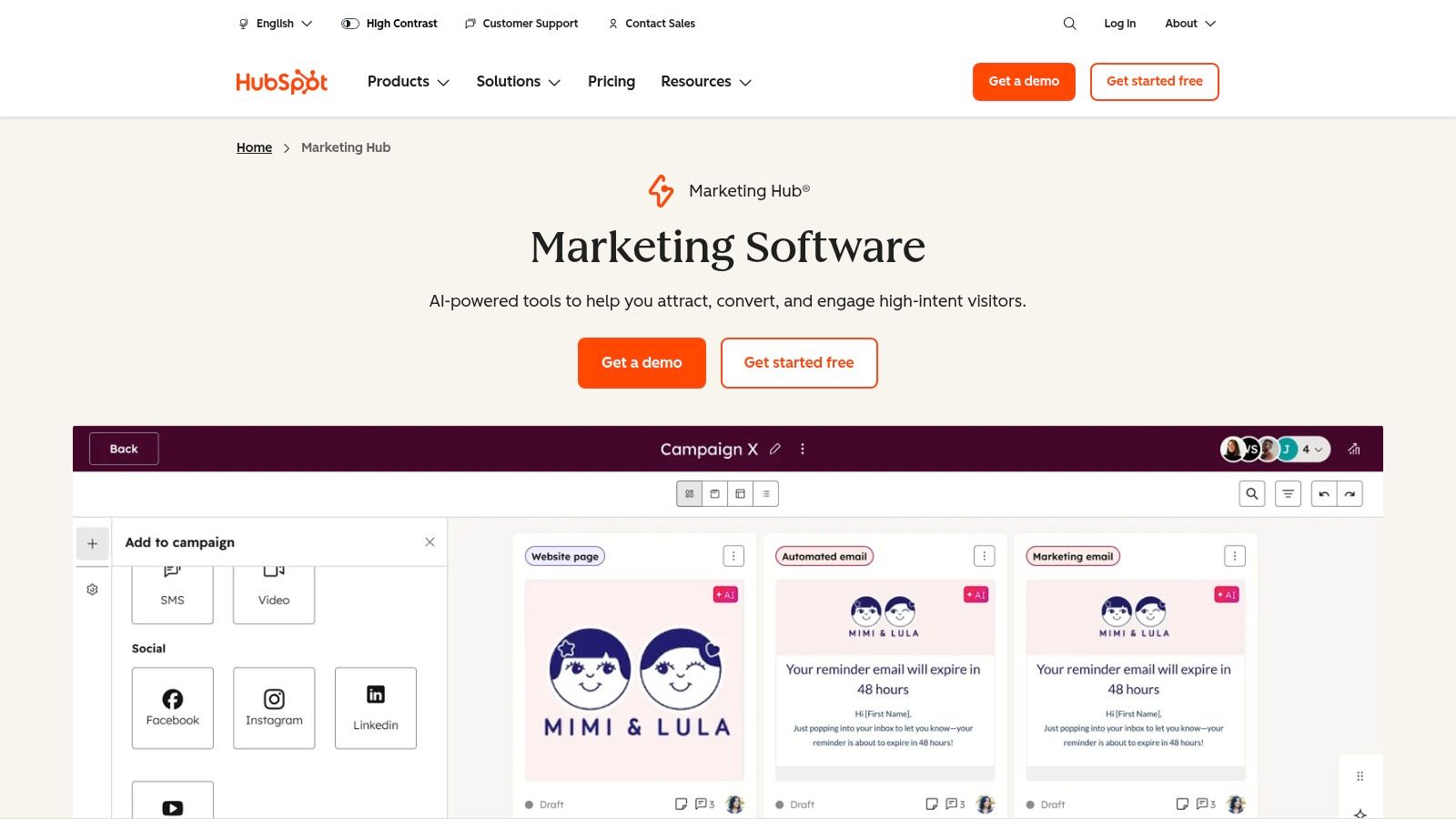
What really sets HubSpot apart is its scalability. You can start with a generous free plan that includes basic email marketing and forms, then scale up as your business grows. The extensive app marketplace and robust reporting give you a unified view of your entire customer journey. While higher-tier plans can get pricey, the platform's user-friendly interface and extensive free educational resources make it accessible for teams just getting started.
- Best For: Businesses wanting a single, scalable platform for marketing, sales, and service.
- Pricing: Starts with a Free plan. Paid tiers begin at $18/month (billed annually).
- Website: hubspot.com/products/marketing
Email-First Automation
3. Mailchimp
Mailchimp is often the first name that comes to mind for email marketing, but it’s grown into a robust platform with some of the best marketing automation tools for small business owners. It excels at making automation accessible, with a user-friendly interface and pre-built customer journey templates. You can easily set up automations for welcome emails, abandoned carts, or re-engagement campaigns without a steep learning curve.
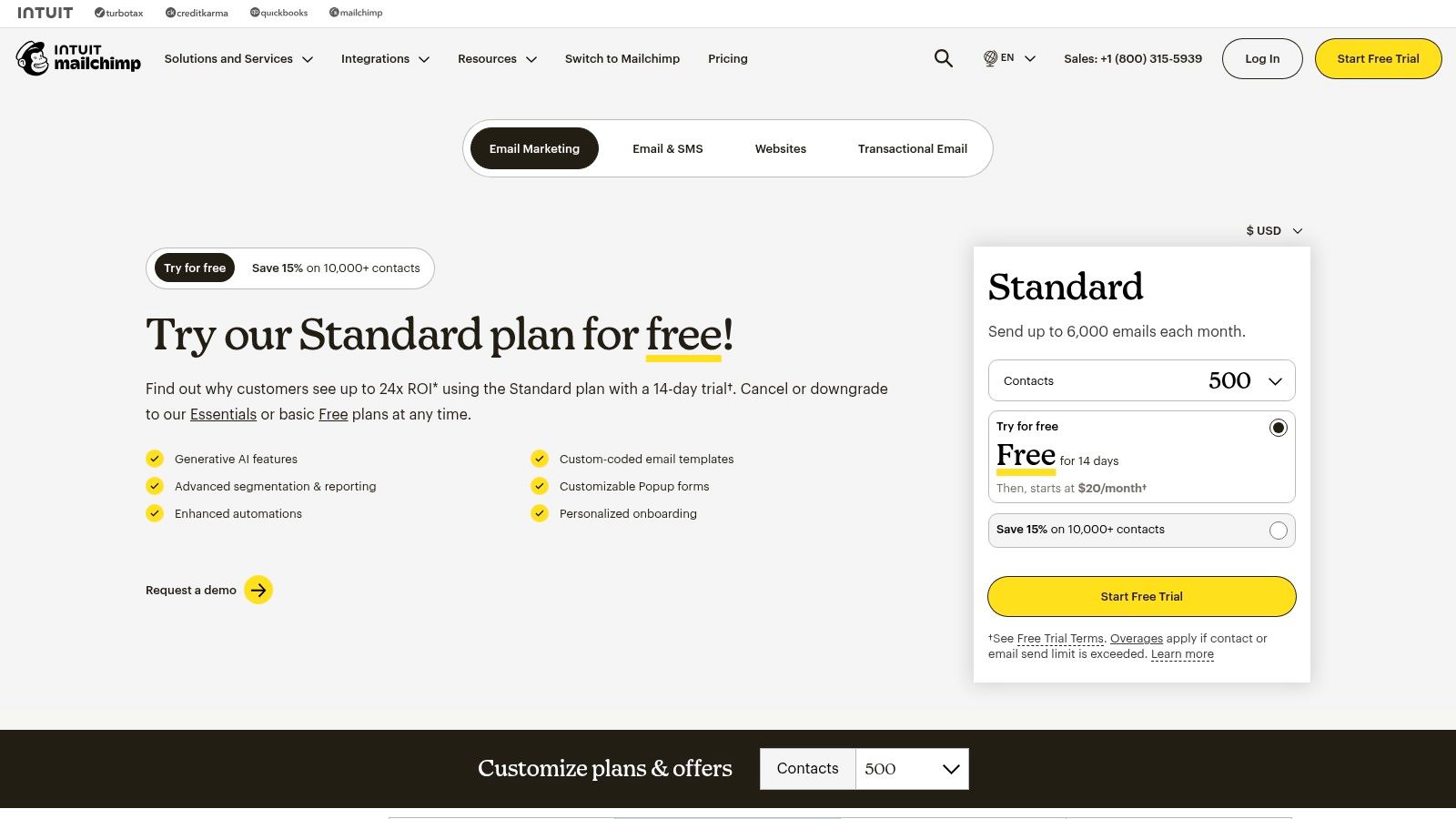
What makes Mailchimp a go-to choice is its huge library of integrations and its familiar, intuitive design. It’s an ideal starting point for businesses focusing on an email-first strategy who can later expand into multichannel marketing. While its free plan is a great entry point, keep in mind that costs can increase quickly as your contact list grows, and more advanced features are reserved for higher-priced tiers. Still, for straightforward, effective automation, it’s a powerful and reliable choice.
- Best For: Small businesses and creators looking for an easy-to-use, email-centric automation platform.
- Pricing: Free plan available. Paid plans start at $13/month for 500 contacts.
- Website: mailchimp.com/pricing/marketing/
Advanced Automation
4. ActiveCampaign
ActiveCampaign shines by combining a powerful CRM with some of the most detailed automation capabilities on the market. It's a top choice among marketing automation tools for small business owners who need to build sophisticated "if this, then that" workflows based on specific user actions—from website visits to email opens. Its visual automation builder is robust, allowing for complex branching logic that many competitors just don't offer at this price point.
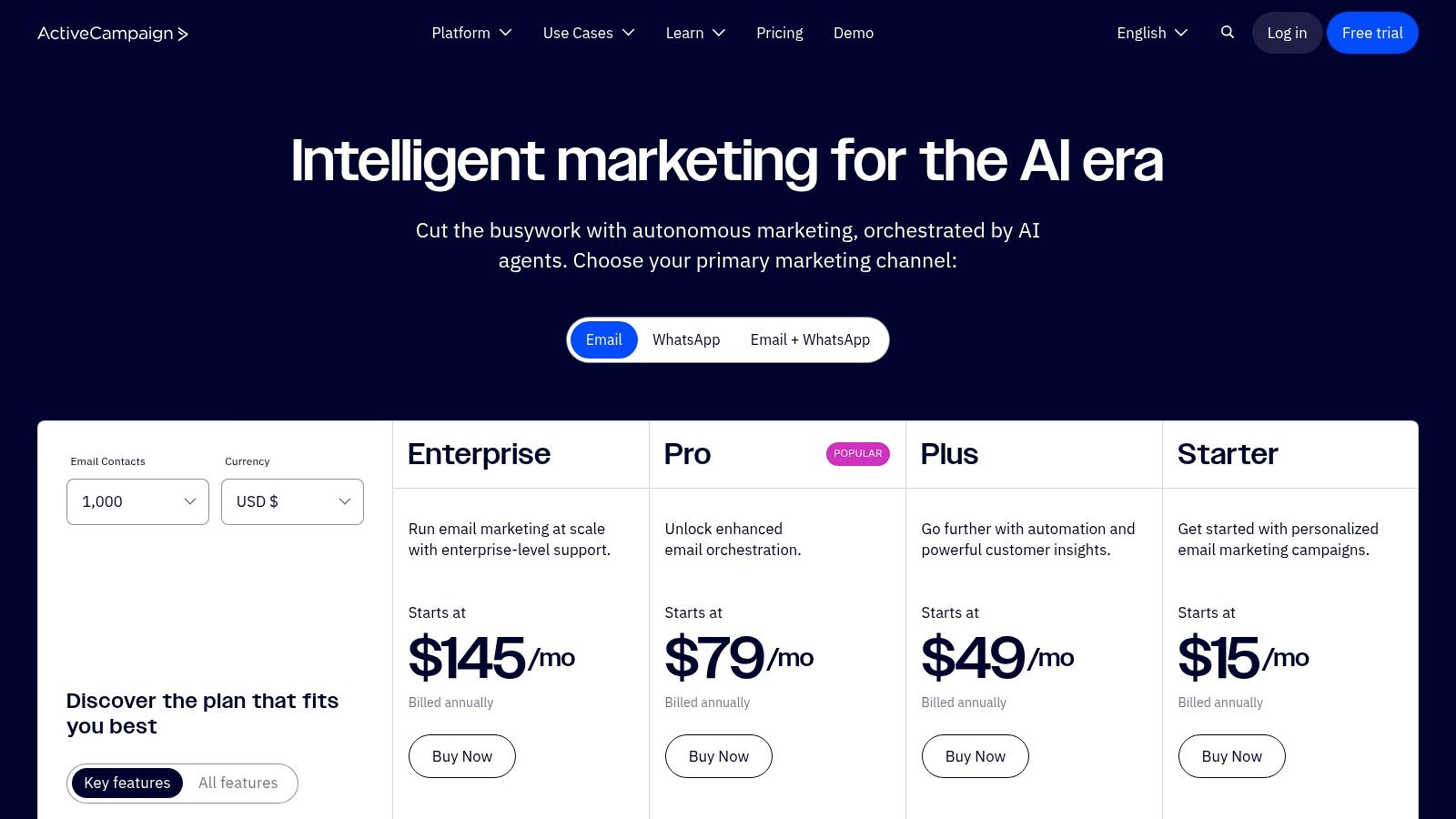
What truly makes ActiveCampaign stand out is its deep integration library and multi-channel communication options, including SMS and WhatsApp triggers. This allows for truly personalized customer journeys. While there's a definite learning curve to master its more advanced features, the platform's focus on conditional logic gives you unparalleled control. Putting these marketing automation best practices into action can unlock some serious engagement. Pricing can also feel a bit mysterious, often requiring a tailored quote, but its power-to-price ratio is hard to beat.
- Best For: Businesses that need advanced, trigger-based automation and deep segmentation without an enterprise budget.
- Pricing: Starts at $29/month (billed annually). A 14-day free trial is available.
- Website: www.activecampaign.com/pricing
Budget-Friendly Multichannel Tool
5. Brevo (formerly Sendinblue)
Brevo, which used to be Sendinblue, carves out its niche by offering a powerful, budget-friendly suite of tools with a unique pricing model. Instead of charging based on how many contacts you have, its plans are mostly based on email send volume. This makes it one of the most cost-effective marketing automation tools for small business owners who have a large contact list but send emails less frequently. The platform gives you a simple drag-and-drop editor for building automated workflows for email, SMS, and web push notifications.
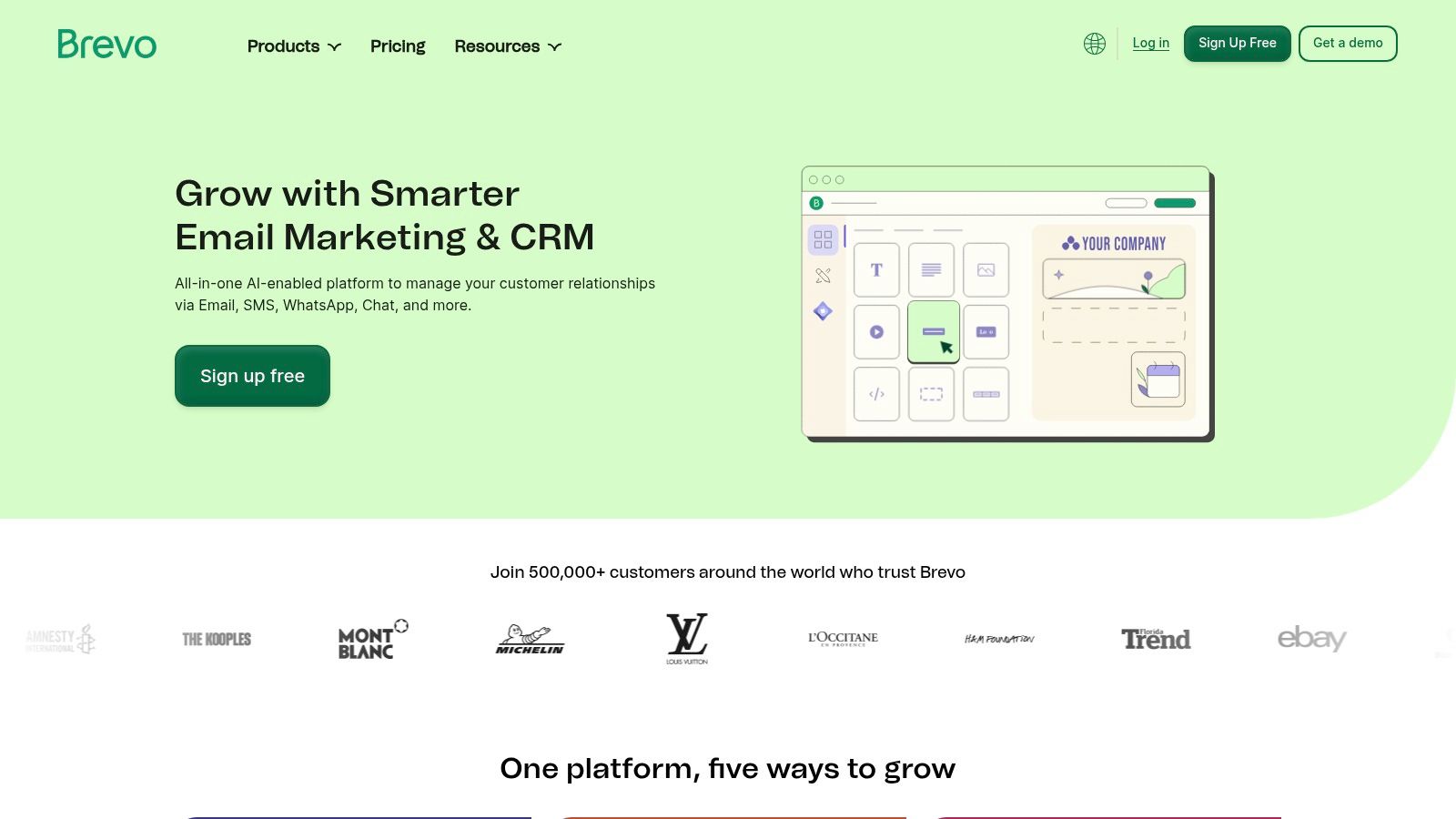
What makes Brevo stand out is its strong support for transactional messaging, making it a great choice for e-commerce stores that need to automate order confirmations, shipping updates, and password resets. While the interface is clean and straightforward, some of its more advanced features, like A/B testing, are reserved for higher tiers. The free plan is quite generous, offering up to 300 emails per day and core automation features, which is an excellent entry point for businesses testing the waters of automation without a big upfront investment.
- Best For: Businesses with large contact lists and e-commerce stores needing strong transactional email capabilities.
- Pricing: Starts with a Free plan. Paid tiers begin at $25/month.
- Website: https://www.brevo.com
All-in-One CRM & Sales
6. Keap (formerly Infusionsoft)
Keap, widely known by its former name Infusionsoft, is a veteran in the automation space, designed as an all-in-one CRM and sales platform for established small businesses. It combines advanced marketing automation with a sales pipeline, appointment scheduling, and even invoicing. This makes it one of the go-to marketing automation tools for small business owners who need to manage leads, clients, and revenue from a single dashboard.
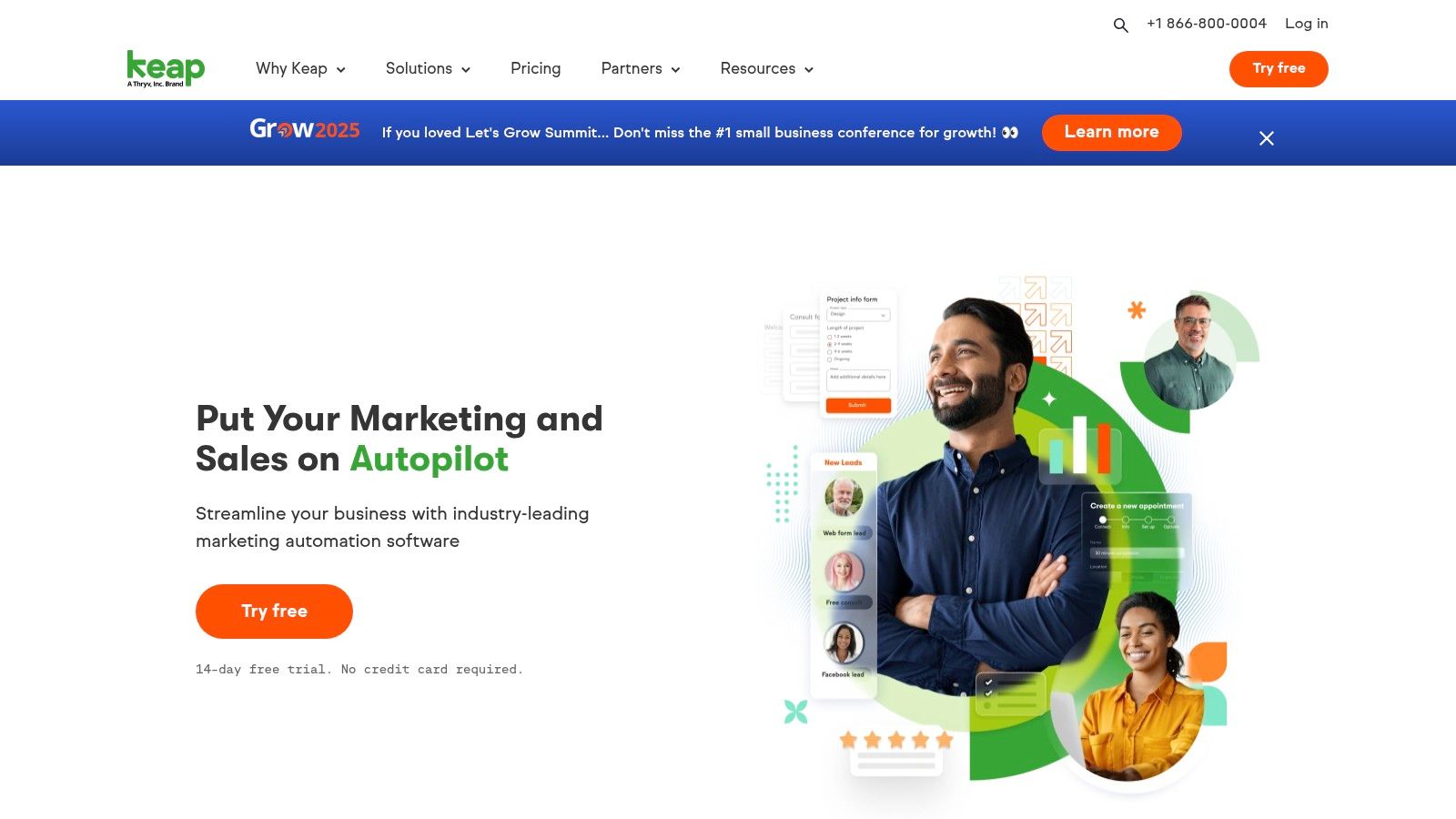
What makes Keap unique is its deep integration of sales and marketing functions. Its powerful "Easy Automations" and an advanced campaign builder let you create complex sequences that trigger based on lead behavior, contact tags, or sales stage movements. While its interface can have a steeper learning curve and the pricing is a big step up from simpler tools, Keap offers expert coaching and migration services to make sure you get set up for success. It’s an ideal solution for service-based businesses that manage a client lifecycle involving proposals, appointments, and payments.
- Best For: Service-based businesses that need to combine marketing automation with sales pipeline management and invoicing.
- Pricing: Starts at $159/month (billed annually).
- Website: https://keap.com
For the Zoho Ecosystem
7. Zoho Marketing Automation (Zoho MarketingHub)
For small businesses already invested in the Zoho ecosystem, Zoho Marketing Automation is a no-brainer. It's a powerful and cost-effective platform that shines brightest when connected to Zoho CRM, creating a seamless flow of data between your sales and marketing teams. Its drag-and-drop journey builder lets you create multichannel campaigns using email, SMS, and even WhatsApp, triggered by specific customer actions or lead scores.
What makes Zoho a standout choice is its value. You get sophisticated features like website behavior tracking, e-commerce integration, and detailed attribution dashboards at a price point that's hard to beat. This focus on analytics helps you connect marketing activities directly to revenue. While its third-party support community isn't as huge as HubSpot's, its tight integration makes it one of the best marketing automation tools for small business owners looking for a unified, affordable solution. Leveraging its features lets you create highly targeted campaigns, which is a core part of effective personalized marketing automation.
- Best For: Small to mid-sized businesses using or planning to use Zoho CRM or Zoho One.
- Pricing: Starts with a Free plan. Paid tiers begin at $19/month (billed annually).
- Website: zoho.com/marketinghub/
Email & Funnel Focused
8. GetResponse
GetResponse positions itself as a powerful, budget-friendly suite of marketing automation tools for small business owners, especially those focused on e-commerce and digital products. It excels by bundling features like sales funnels, webinar hosting, and unlimited email sends into plans that often undercut competitors. Its visual workflow builder is straightforward, letting you create automated sequences based on user actions like purchases or abandoned carts, complete with revenue tracking.
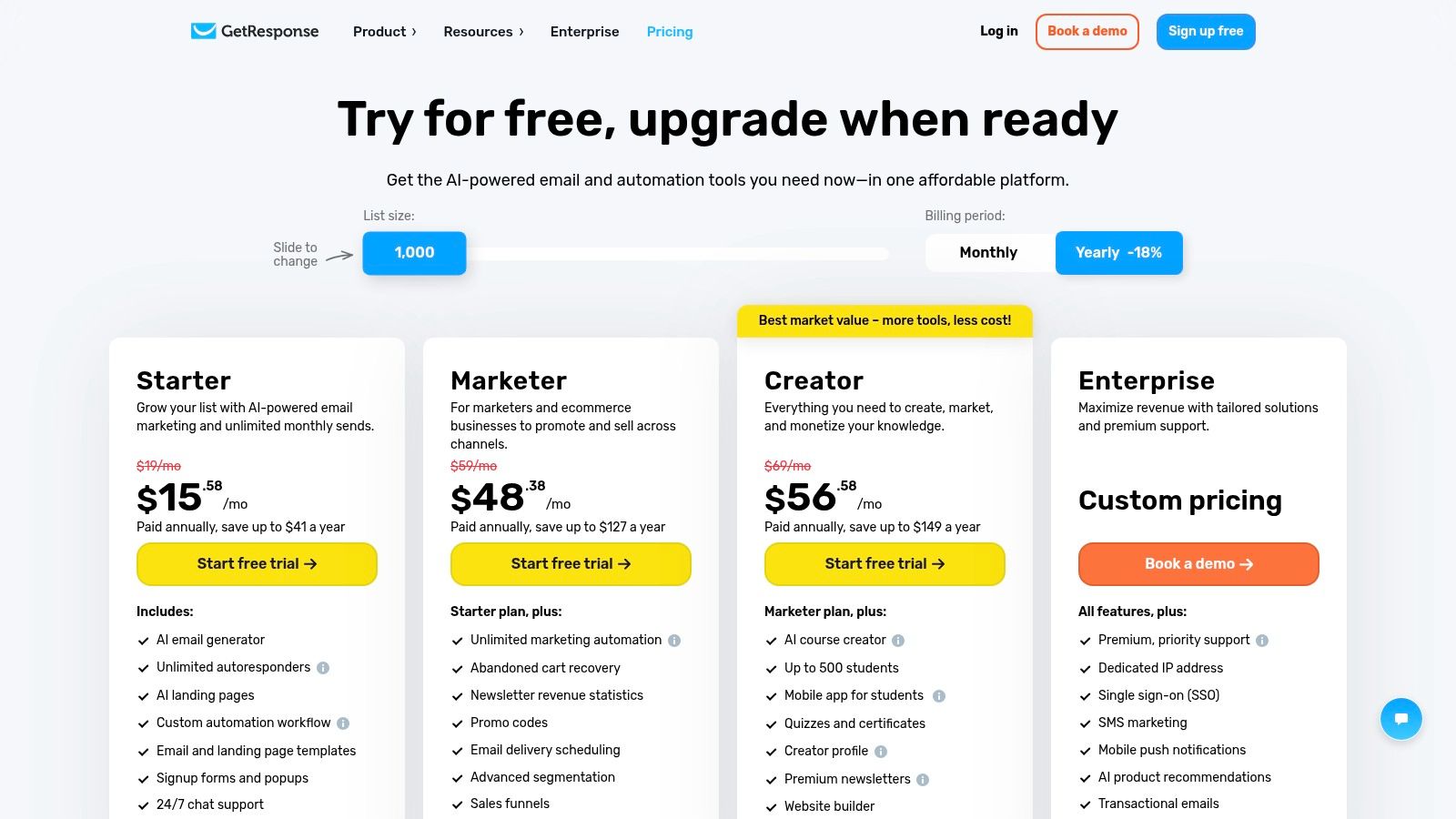
What makes GetResponse a strong contender is its focus on value. While many platforms gatekeep their best automation features, its "Marketing Automation" plan provides unlimited workflows and advanced segmentation at a very accessible price. This all-in-one approach extends to landing pages, pop-ups, and even web push notifications. While the interface isn't as polished as some premium tools and pricing scales with your list size, it’s an incredibly feature-rich platform for businesses wanting to grow without a massive initial investment.
- Best For: E-commerce businesses and digital creators needing integrated funnels, webinars, and email automation.
- Pricing: Starts with a Free plan. Paid tiers begin at $13.30/month (billed annually) for 1,000 contacts.
- Website: www.getresponse.com/pricing
Ecommerce Powerhouse
9. Klaviyo
For direct-to-consumer brands, especially those on Shopify, Klaviyo is the undisputed champion. It’s an e-commerce-centric platform designed from the ground up to turn customer data into revenue. Its deep integrations allow you to build sophisticated automations based on real-time browsing behavior and purchase history, making it one of the most powerful marketing automation tools for small business owners in the e-commerce space.
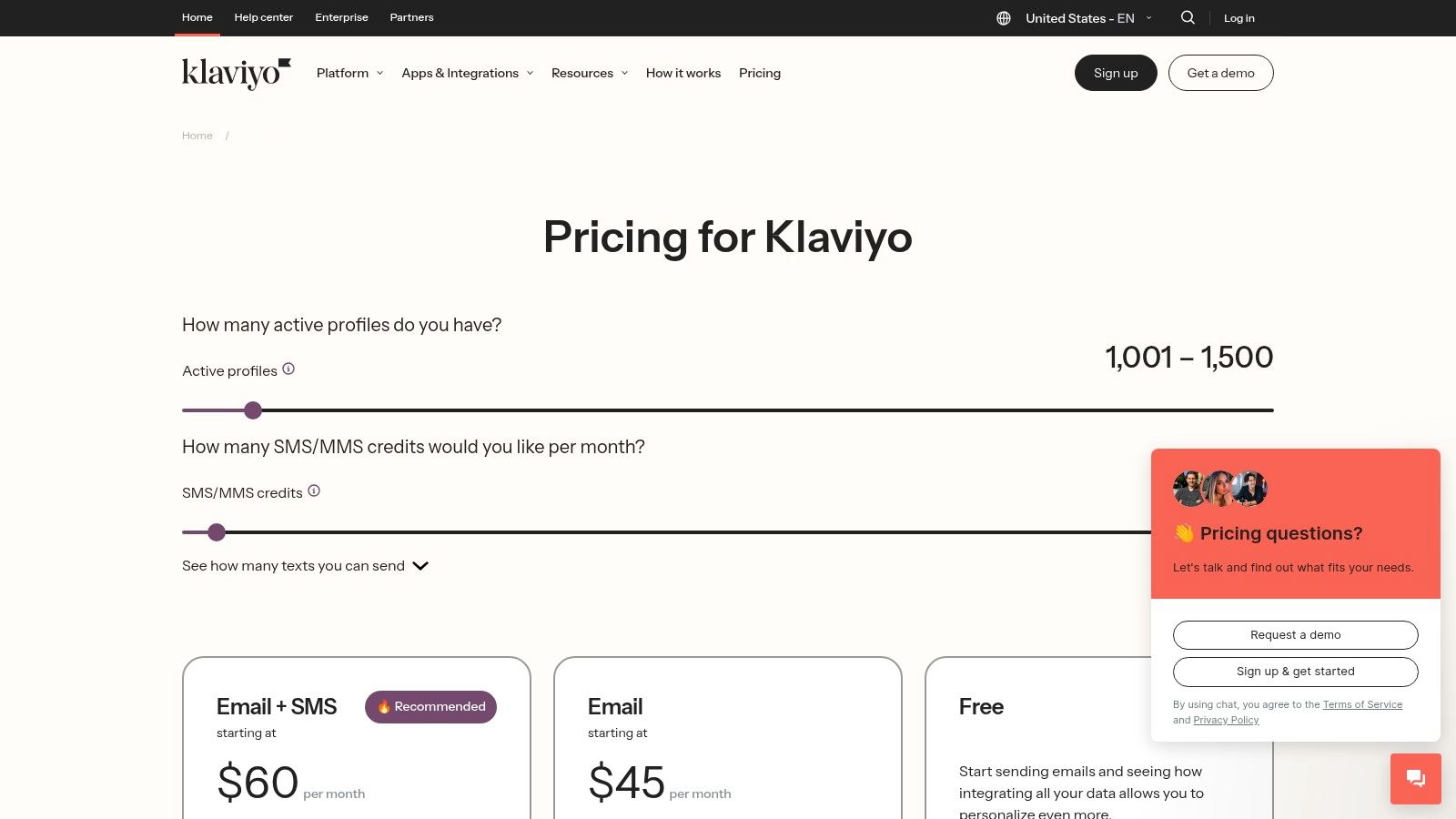
What makes Klaviyo stand out is its laser focus on revenue-driving activities. Pre-built flows for abandoned carts, browse abandonment, and win-back campaigns are incredibly effective and easy to set up. The platform combines email, SMS, and push notifications into a single customer profile, giving you a unified view for creating personalized journeys. While it might be overkill for non-commerce businesses and costs can scale quickly with your contact list, its ability to tie every single campaign directly to sales is invaluable for online stores.
- Best For: Ecommerce businesses, particularly on Shopify, wanting to drive sales through hyper-targeted email and SMS.
- Pricing: Free for up to 250 contacts. Paid plans start at $20/month for email, with separate pricing for SMS.
- Website: www.klaviyo.com
eCommerce Native
10. Shopify Automations
For businesses running on Shopify, the built-in Automations feature is a total game-changer. It brings essential marketing automation directly into the platform you already use, eliminating the need for complex third-party tools for core tasks. You can quickly set up always-on campaigns like abandoned cart reminders, welcome series, and win-back flows using a simple trigger-condition-action builder and pre-made templates.
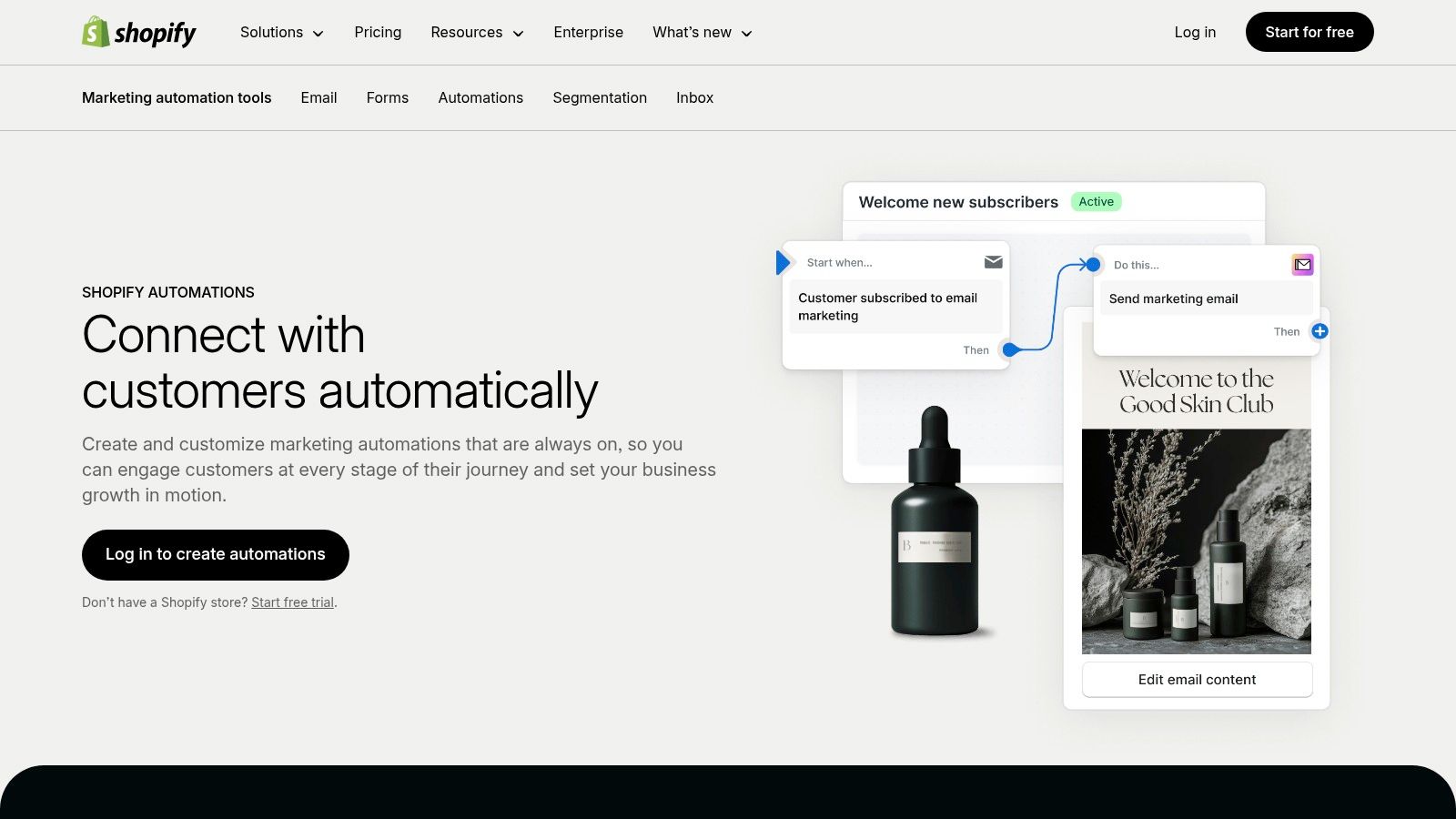
What makes Shopify Automations stand out is its seamless integration with your store's data and the wider Shopify ecosystem. While its native capabilities are more focused than dedicated suites, it perfectly handles the most critical e-commerce automations. For more complex workflows, it connects with Shopify Flow and thousands of App Store apps to add SMS or push notifications. It's one of the most accessible marketing automation tools for small business owners who want powerful, native functionality without leaving their Shopify admin.
- Best For: Shopify store owners who need a simple, native solution for essential eCommerce marketing automation.
- Pricing: Included with paid Shopify plans (starts at $29/month, billed annually).
- Website: www.shopify.com/marketing-automation
Software Marketplace & Review Hub
11. G2 – Marketing Automation Category
Before you commit to a platform, a visit to G2’s Marketing Automation category is a crucial research step. It’s a massive software marketplace where you can compare dozens of marketing automation tools for small business side-by-side based on verified user reviews. Instead of just relying on a vendor’s marketing copy, you get unbiased insights from real users.
What makes G2 so valuable is its powerful filtering system. You can narrow down options specifically for small businesses, read summarized pros and cons, and see how tools stack up in their proprietary Grid reports. This helps you quickly create a shortlist of relevant platforms to explore further. While some reviews might be incentivized, the sheer volume of data gives you a reliable snapshot of the market landscape. It’s the perfect place to start your search and validate your choices.
- Best For: Comparing tools and reading verified user reviews before making a purchase decision.
- Pricing: Free to browse and compare products.
- Website: g2.com/categories/marketing-automation
Specialized Tool Marketplace
12. AppSumo (Marketing/Automation Deals)
While not a single platform itself, AppSumo is a crucial resource for any small business looking to experiment with marketing automation tools for small business on a tight budget. It's a marketplace offering lifetime deals (LTDs) on emerging software. This lets you purchase a tool for a one-time fee instead of a recurring monthly subscription, making it an incredibly cost-effective way to test new functionality like AI writers, social media schedulers, or lead-gen pop-ups.
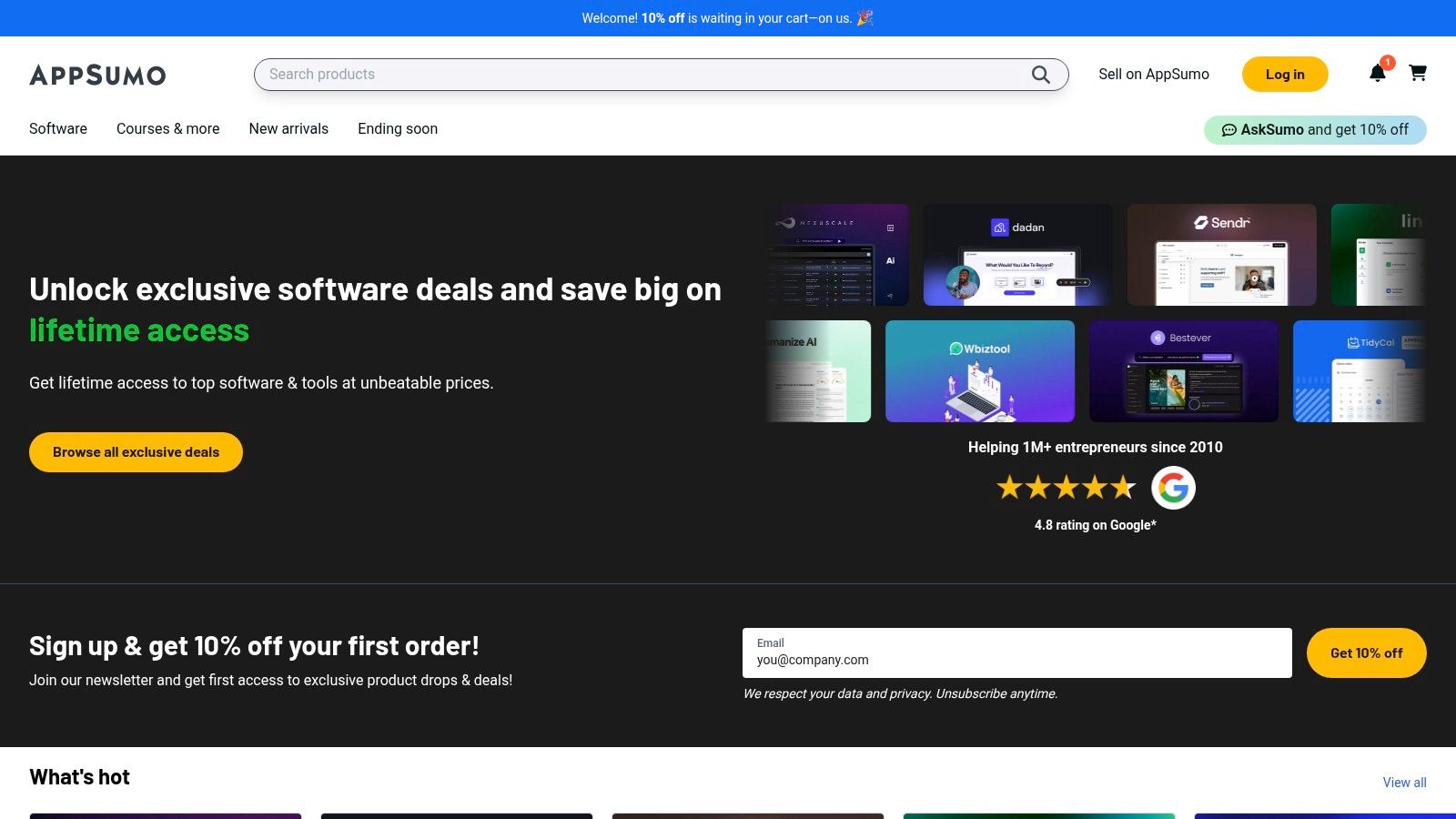
What makes AppSumo unique is its role as a launchpad for innovative and niche tools you won't find anywhere else. The community-driven reviews are a goldmine for vetting unproven software, and the refund window provides a safety net. The risk is that some startups may pivot or shut down, but the potential reward is securing a powerful tool for a fraction of its future cost. For finding specialized add-ons to complement your core marketing stack without committing to another monthly payment, AppSumo is an invaluable spot for savvy entrepreneurs.
- Best For: Budget-conscious businesses wanting to test emerging tools or find lifetime deals on specialized software.
- Pricing: Based on individual, limited-time deals, often ranging from $39 to $79 for a lifetime license.
- Website: appsumo.com
Marketing Automation Tools Comparison: Top 12 Features
| Platform | Core Features | User Experience / Quality Metrics | Value Proposition | Target Audience | Price Points / Notes |
|---|---|---|---|---|---|
| OwlDock | PDF lead magnets, smart forms, behavioral triggers | Intuitive analytics dashboard, easy setup | Transforms PDFs into high-converting lead magnets, secure | Marketers, sales teams, SMBs, educators | Pricing not transparent; max PDF size 2MB |
| HubSpot Marketing Hub | CRM integration, workflow automation, omnichannel | Large user base, strong onboarding | All-in-one marketing, sales, and service suite | Mid to large businesses, marketing teams | Clear contact-tier pricing; onboarding fees |
| Mailchimp | Email automation, segmentation, templates | Familiar UX, broad integrations | Flexible pricing, good for email-first marketing | Small businesses, beginners | Free tier available; costs rise with list size |
| ActiveCampaign | Multi-channel automations, built-in CRM | Powerful automations, 14-day free trial | Granular automation for SMBs | SMBs needing advanced workflows | Pricing often requires tailored quotes |
| Brevo (Sendinblue) | Drag-and-drop automation, email, SMS, web push | Basic interface, send-time optimization | Low entry price, good for ecommerce | Growing lists, ecommerce businesses | Pay-by-send model; some features tier-gated |
| Keap (Infusionsoft) | CRM, email, payments, pipelines | Hands-on migration assistance | Combines marketing and sales tools | SMBs needing all-in-one CRM | Higher pricing; onboarding fees |
| Zoho Marketing Automation | Multichannel journey builder, lead scoring | Competitive pricing, Zoho ecosystem integration | Good value especially if using Zoho CRM | SMBs, Zoho users | Pricing varies by locale; US pricing not always clear |
| GetResponse | Email sends, automation builder, webinars | Transparent plans, 30-day trial | Strong value for SMB automation | SMBs needing funnels and ecommerce features | Pricing based on list size |
| Klaviyo | Ecommerce integration, email & SMS journeys | Revenue-focused analytics, dynamic personalization | Best for ecommerce and DTC brands | Ecommerce stores, Shopify users | Costs grow with active profiles; add-ons required |
| Shopify Automations | Native Shopify triggers, email & SMS | Minimal setup, integrated reporting | Seamless for Shopify stores | Shopify merchants | Requires paid Shopify plan |
Marketing Automation
Now It's Your Turn to Automate and Grow
We've just walked through a wide range of powerful marketing automation tools for small business, from all-in-one giants like HubSpot to e-commerce specialists like Klaviyo. Each platform offers a unique blend of features designed to help you reclaim your time, nurture leads more effectively, and drive consistent growth. The journey through these options reveals one clear truth: there's no single "best" tool for everyone.
The ideal choice depends entirely on your specific situation. An e-commerce brand will have different needs than a B2B service provider, and a solopreneur's budget won't match a growing team's. The key takeaway is to stop looking for a perfect solution and start searching for the right-fit solution for where your business is today.
How to Choose Your First Automation Tool
Feeling overwhelmed? Don't be. Choosing the right tool is a strategic process, not a guessing game. Here’s a simple way to guide your decision:
- Identify Your Biggest Bottleneck: What's the one repetitive task that eats up the most time or causes the most headaches? Is it lead follow-up? Onboarding new customers? Segmenting your audience? Pinpoint that primary pain point first.
- Define Your Core Goal: Do you want to increase lead conversion, boost customer lifetime value, or simply save 10 hours a week? Your main objective will immediately narrow down the field. For example, if your goal is purely email engagement, a tool like Mailchimp or Brevo might be perfect. If it's aligning sales and marketing, Keap or ActiveCampaign could be a better fit.
- Start Small and Scale Up: You don't need to automate your entire business overnight. Pick a tool that excels at solving your main bottleneck. Master that one workflow. Once you see the ROI and get comfortable, you can explore more advanced features.
Your Action Plan for Implementation
Remember, the most powerful software is useless if it just sits on the shelf. Success with marketing automation tools for small business comes down to thoughtful implementation. As you get started, focus on creating simple, high-impact workflows. A welcome email series for new subscribers or an abandoned cart reminder are fantastic starting points that deliver real results.
Ultimately, automation is about creating systems that work for you, not the other way around. It’s your secret weapon for scaling your business without scaling your workload. By choosing a tool that aligns with your goals and starting with a clear, focused plan, you’ll unlock the time and resources you need to focus on what truly matters: building relationships, delighting customers, and growing your brand.
Ready to simplify your client and project management with smart automation? OwlDock integrates client onboarding, task management, and communication into one streamlined platform, freeing you up to focus on delivering amazing work. Discover how OwlDock can automate your workflow today.